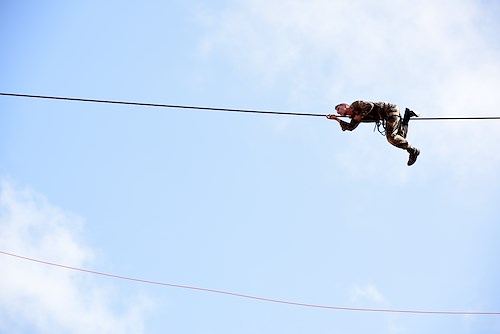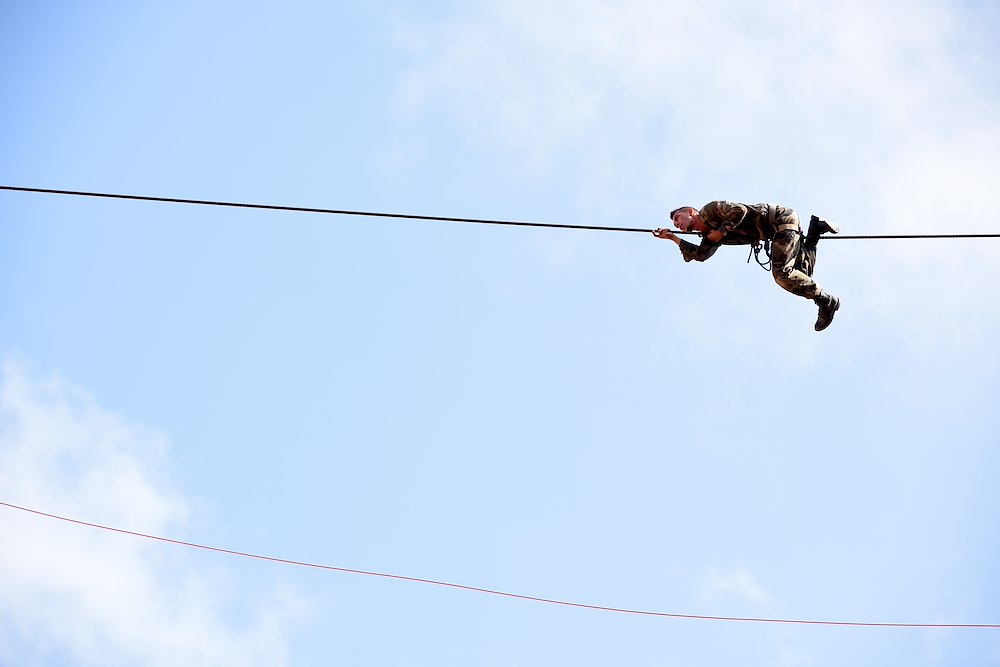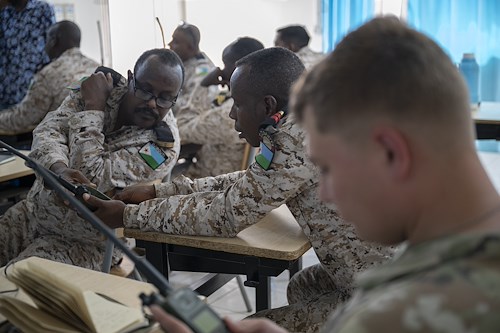Gallery contains 9 images
×
Photo 1 of 9
Combined Joint Task Force - Horn of Africa Image
A French soldier makes his way across a single cable during a French Desert Survival Course near Arta Beach, Djibouti, Jan. 13, 2016. U.S. and French soldiers learned to fight, survive and navigate Djibouti’s desert during the course. (U.S. Air Force photo by Staff Sgt. Kate Thornton)
Photo by: U.S. Air Force Staff Sgt. Kate Thornton
Photo 2 of 9
Combined Joint Task Force - Horn of Africa Image
A French army survival instructor teaches French and U.S. soldiers how to make flatbread during a French Desert Survival Course near Arta Beach, Djibouti, Jan. 13, 2016. Trainees learned how to use the resources available in a desert-like environment to prepare food and survive. (U.S. Air Force photo by Staff Sgt. Kate Thornton)
Photo by: U.S. Air Force Staff Sgt. Kate Thornton
Photo 3 of 9
Combined Joint Task Force - Horn of Africa Image
U.S. Army Spc. Christopher Reeves, 2-124 Infantry Battalion mechanic, grills flatbread during a French Desert Survival Course near Arta Beach, Djibouti, Jan. 13, 2016. Using techniques that can be used in survival situations, students worked together to make a meal for the whole group. (U.S. Air Force photo by Staff Sgt. Kate Thornton)
Photo by: U.S. Air Force Staff Sgt. Kate Thornton
Photo 4 of 9
Combined Joint Task Force - Horn of Africa Image
U.S. and French soldiers make flatbread during a French Desert Survival Course near Arta Beach, Djibouti, Jan. 13, 2016. Using techniques that can be used in survival situations, students worked together to make a meal for the whole group. (U.S. Air Force photo by Staff Sgt. Kate Thornton)
Photo by: U.S. Air Force Staff Sgt. Kate Thornton
Photo 5 of 9
Combined Joint Task Force - Horn of Africa Image
French and U.S. soldiers complete the mountain portion during a French Desert Survival Course near Arta Beach, Djibouti, Jan. 13, 2016. The course prepares soldiers to survive in a desert climate by teaching participants combat lifesaving skills, field tactics, land navigation, weapons training, trap setting, survival cooking and water-source locating. (U.S. Air Force photo by Staff Sgt. Kate Thornton)
Photo by: U.S. Air Force Staff Sgt. Kate Thornton
Photo 6 of 9
Combined Joint Task Force - Horn of Africa Image
A French soldier swings to netting during a French Desert Survival Course near Arta Beach, Djibouti, Jan. 13, 2016. In addition to survival tactics, the service members broke into four platoons, working together to complete a water obstacle course and the “Path of the Unconscious,” a mountain training course carved out of a cliff approximately 300 feet high. (U.S. Air Force photo by Staff Sgt. Kate Thornton)
Photo by: U.S. Air Force Staff Sgt. Kate Thornton
Photo 7 of 9
Combined Joint Task Force - Horn of Africa Image
U.S. Army Spc. Matthew Ibasfalean, 2-124 Infantry Battalion soldier, swings and grabs netting during a French Desert Survival Course near Arta Beach, Djibouti, Jan. 13, 2016. By completing the course, service members earned the desert commando badge as a merit to their endeavors. (U.S. Air Force photo by Staff Sgt. Kate Thornton)
Photo by: U.S. Air Force Staff Sgt. Kate Thornton
Photo 8 of 9
Combined Joint Task Force - Horn of Africa Image
A French soldier attaches himself to a safety cable during a French Desert Survival Course near Arta Beach, Djibouti, Jan. 13, 2016. The course prepares soldiers to survive in a desert climate by teaching participants combat lifesaving skills, field tactics, land navigation, weapons training, trap setting, survival cooking and water-source locating. (U.S. Air Force photo by Staff Sgt. Kate Thornton)
Photo by: U.S. Air Force Staff Sgt. Kate Thornton
Photo 9 of 9
Combined Joint Task Force - Horn of Africa Image
A French soldier climbs a pole during a French Desert Survival Course near Arta Beach, Djibouti, Jan. 13, 2016. The mountain portion of the course, named the “Path of the Unconscious,” consists of ropes, nets, poles, 3-wire, single-wire and flat-surface obstacles carved out of a cliff approximately 300 feet high. (U.S. Air Force photo by Staff Sgt. Kate Thornton)
Photo by: U.S. Air Force Staff Sgt. Kate Thornton
Many people might wonder if they could simply survive in a desert with limited equipment, food and water. For soldiers located in the subtropical desert climate of Djibouti, they need to not only survive, but also complete their mission.
The French Desert Survival Course prepares hundreds of U.S. and French military members to perform a variety of tasks at such a demanding duty assignment.
French soldiers deployed to the region and U.S. soldiers assigned to Combined Joint Task Force-Horn of Africa completed phase two of the course near Arta Beach, Djibouti, Jan. 13, 2016.
The nearly month-long course for infantrymen consists of up to seven phases that teach participants combat lifesaving skills, field tactics, land navigation, weapons training, trap setting, survival cooking, and water-source locating.
“It’s good preparation because the climate makes the course harder for us and we have to practice our [job as infantrymen] in this specific context,” said Capitaine Benoit, French Army infantry officer.
By the time the soldiers complete the course, they will have learned survival tactics, accomplished water and mountain obstacle courses and, most importantly, gained confidence.
“The hands-on experiences this course gives you really takes away the hesitation you have about if you can handle the desert environment,” said U.S. Army Spc. Michael Klaassen, Alpha Company 3-15th infantryman and student of the course.
The men and women who complete this course gain practical knowledge for surviving in austere environments, giving them the assurance they need to stay calm and apply what they’ve learned.
“[The students] get a whole lot of confidence in their own abilities and progress by being able to work with other units,” said Staff Sgt. Michael Lawrence, Alpha Company 3-15th infantryman and course assistant instructor. “This is a great way to be able to learn how to communicate with each other and work effectively.”
Communication is key in any line of work, but can be lifesaving on the battlefield.
“A lot of [the training] has been physical, and we’ve really come together as a team,” Klaassen said. “Communication skills have really developed with our platoon alone, which helps us get past these obstacles even faster.”
As a merit to their hard work and completion of the course, soldiers will earn the desert commando badge – a qualification and honor coveted by officer and enlisted soldiers alike.
“For us it’s a good opportunity to work with other countries because we have to exchange our practices. From the high level to the privates, we have to understand each other, so it’s very good for us,” Benoit said
































